Search Result
Results for "
Chemotherapeutic
" in MedChemExpress (MCE) Product Catalog:
1
Biochemical Assay Reagents
6
Isotope-Labeled Compounds
| Cat. No. |
Product Name |
Target |
Research Areas |
Chemical Structure |
-
- HY-152246
-
|
|
DNA/RNA Synthesis
|
Cancer
|
|
ZIM, a norbornene derived from 4-Aminoantipyrine, is a potent inducer of DNA damage, causing genomic and chromosomal damage as well as inducing cell death and activating phagocytosis. ZIM has chemotherapeutic potential for use in cancer research .
|
-
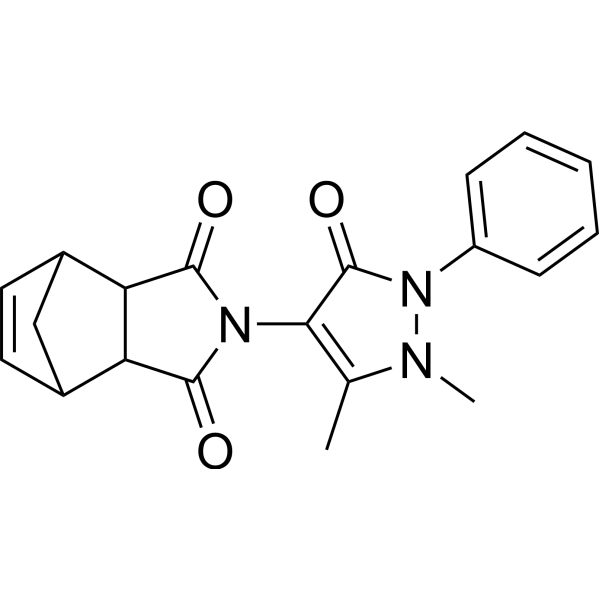
-
- HY-130751
-
|
|
Liposome
|
Inflammation/Immunology
|
|
DODAP is a cationic lipid. The ionizable lipid DODAP is the lipid component of liposomes (pKa = 5.59 in TNS binding tests). DODAP can be used for siRNA encapsulation and in vitro and in vivo delivery of immunostimulated chemotherapeutic active molecules .
|
-
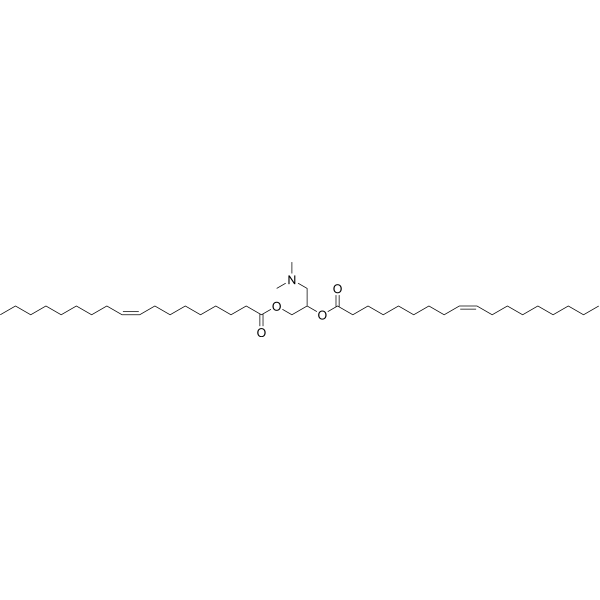
-
- HY-B0245
-
|
|
DNA Alkylator/Crosslinker
Apoptosis
|
Inflammation/Immunology
Cancer
|
|
Busulfan is a potent alkylating antineoplastic agent. Busulfan causes DNA damage by cross-linking DNAs and DNA and proteins. Busulfan inhibits thioredoxin reductase. Busulfan induces apoptosis. Busulfan is an immunosuppressive and myeloablative chemotherapeutic agent .
|
-
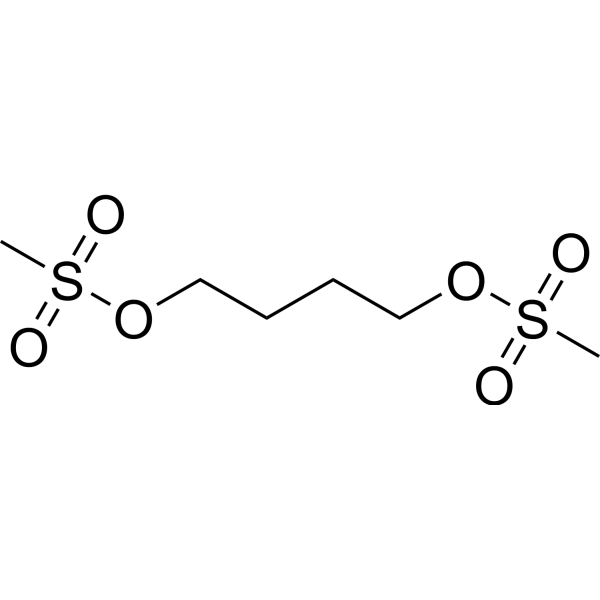
-
- HY-B0245S
-
|
|
DNA Alkylator/Crosslinker
Apoptosis
|
Inflammation/Immunology
Cancer
|
|
Busulfan-d8 is a deuterium labeled Busulfan. Busulfan is a potent alkylating antineoplastic agent. Busulfan causes DNA damage by cross-linking DNAs and DNA and proteins. Busulfan inhibits thioredoxin reductase. Busulfan induces apoptosis. Busulfan is an immunosuppressive and myeloablative chemotherapeutic agent[1][2][3].
|
-
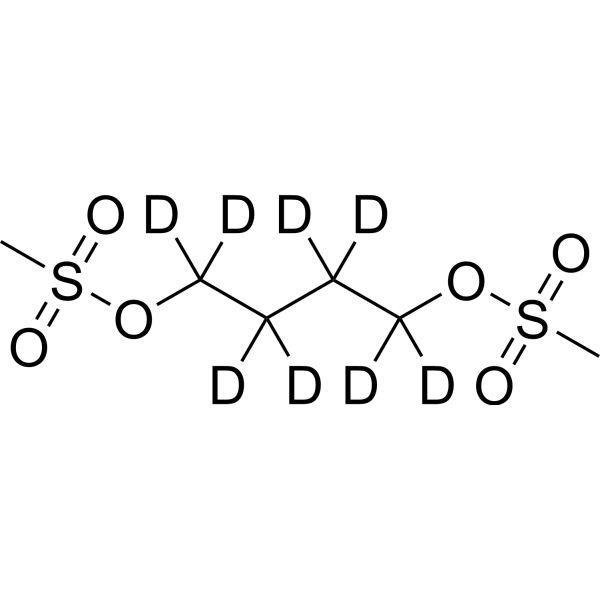
-
- HY-136327
-
|
|
DNA Alkylator/Crosslinker
|
Cancer
|
|
Phenylacetic acid mustard is the major metabolite of the cancer chemotherapeutic agent Chlorambucil (HY-13593). Chlorambucil is an alkylating agent with antitumor activity .
|
-
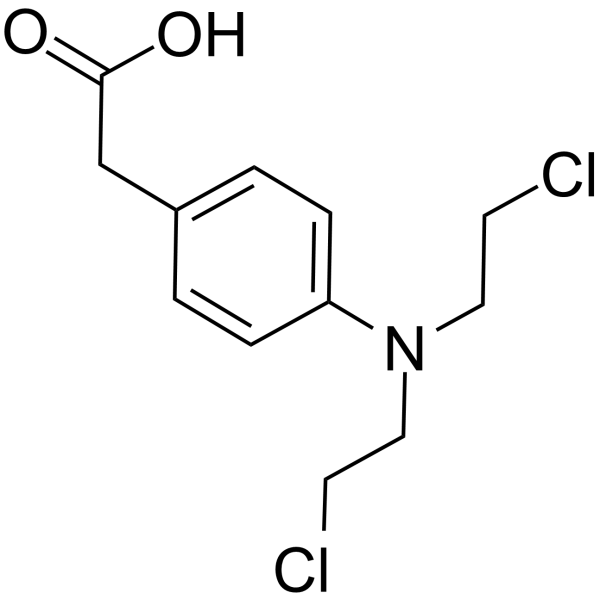
-
- HY-N3446
-
|
|
Apoptosis
|
Cancer
|
|
IVHD-valtrate, an active Valeriana jatamansi derivative, is against human ovarian cancer cells in vitro and in vivo. IVHD-valtrate induces cancer cells apoptosis and arrests the ovarian cancer cells in the G2/M phase. IVHD-valtrate has the potential to be a novel chemotherapeutic agent for the human ovarian cancer research .
|
-
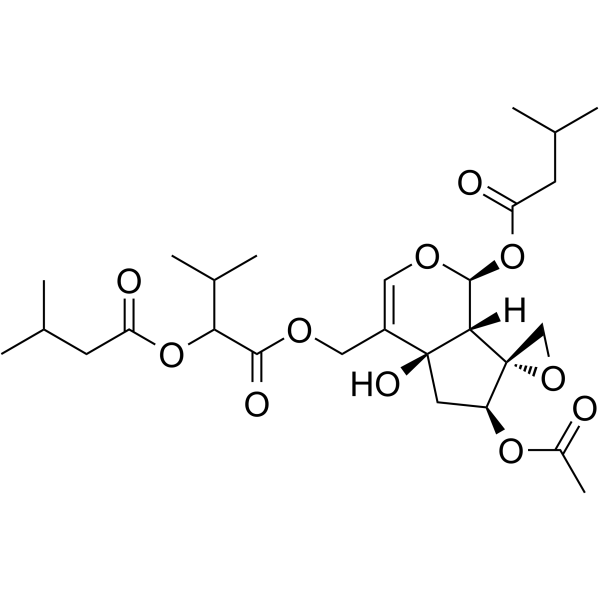
-
- HY-108391
-
|
N-Octanoyl-D-erythro-sphingosine
|
Apoptosis
PKC
Autophagy
|
Inflammation/Immunology
Cancer
|
|
C8-Ceramide (N-Octanoyl-D-erythro-sphingosine) is a cell-permeable analog of naturally occurring ceramides. C8-Ceramide has anti-proliferation properties and acts as a potent chemotherapeutic agent. C8-Ceramide stimulates dendritic cells to promote T cell responses upon virus infections. C8-Ceramide induces slight activation of protein kinase (PKC) in vitro .
|
-
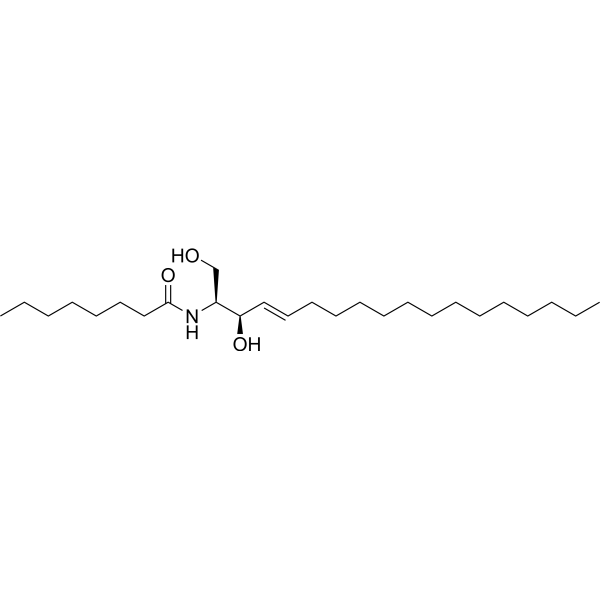
-
- HY-115932
-
|
|
Aurora Kinase
Apoptosis
|
Cancer
|
|
Aurora kinase-IN-1 (Compound 9) is a potent inhibitor of aurora kinase. Aurora kinase-IN-1 upregulates the expression of G1 cell cycle inhibitory proteins including p21 and p27, and G1 progressive cyclin D1, and downregulates G1-to-S progressive cyclins, resulting in cell cycle arrest at the G1/S boundary. Aurora kinase-IN-1 also induces apoptosis. Aurora kinase-IN-1 is a lead compound for chemotherapeutic agents .
|
-
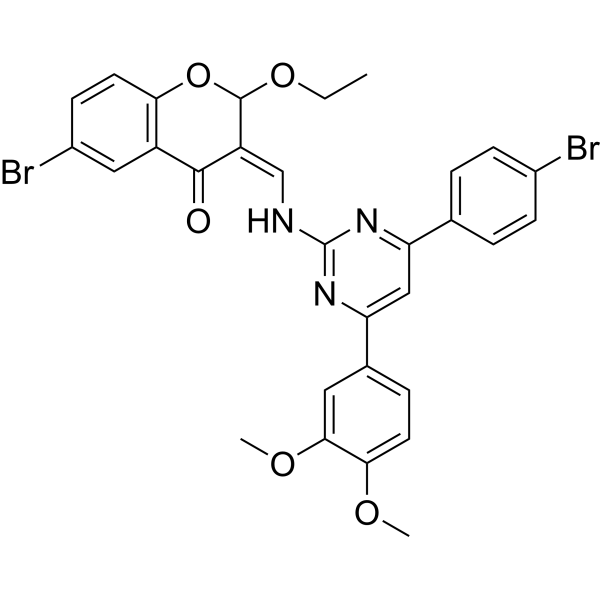
-
- HY-17419
-
-
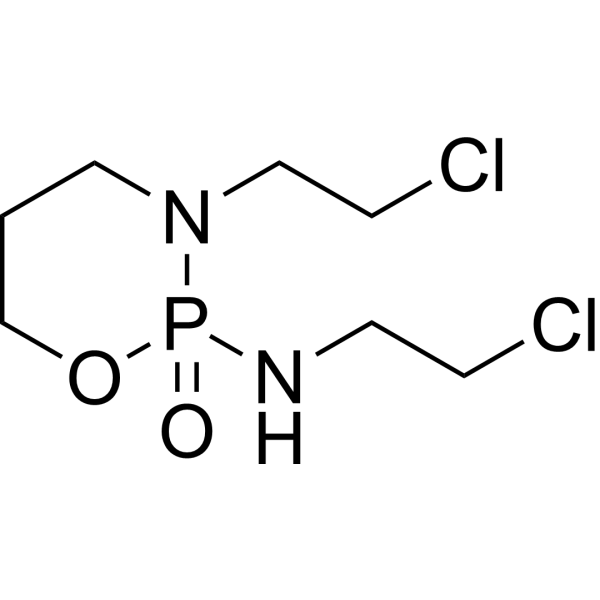
-
- HY-13585
-
-
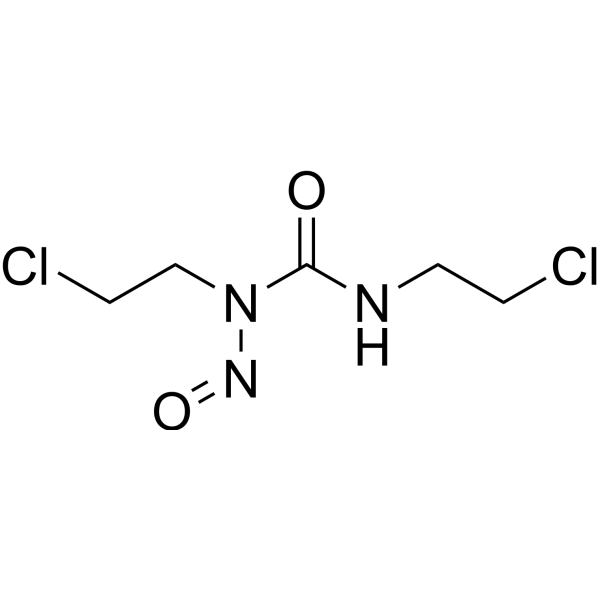
-
- HY-13761
-
|
VM26
|
Topoisomerase
|
Cancer
|
|
Teniposide is a podophyllotoxin derivative, acts as a topoisomerase II inhibitor, and used as a chemotherapeutic agent.
|
-
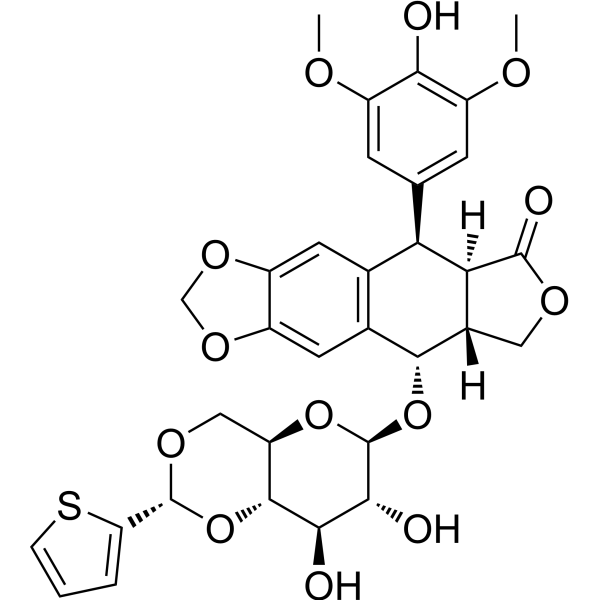
-
- HY-13747
-
-
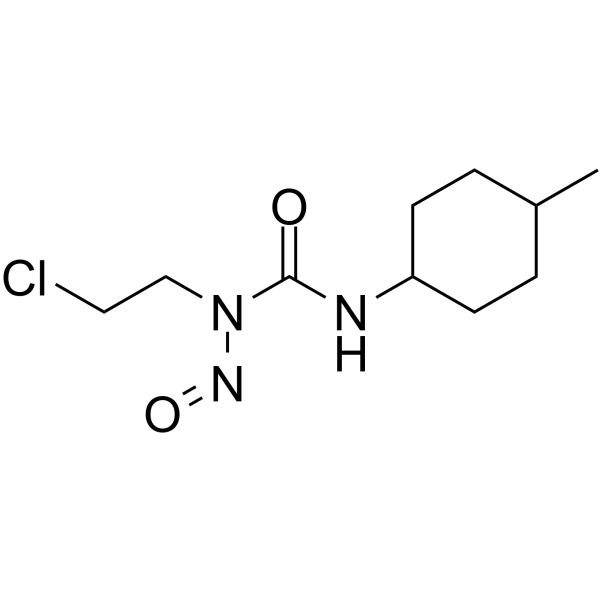
-
- HY-N9451
-
-
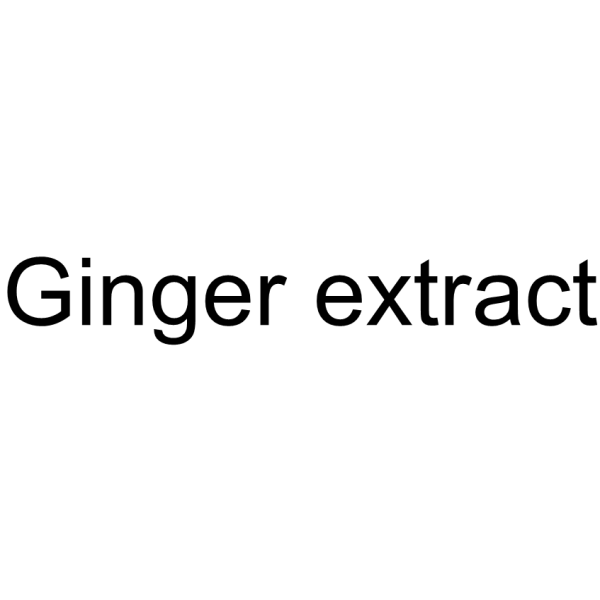
-
- HY-B1782
-
|
|
|
|
|
Sulfamoxole is a broad- spectrum chemotherapeutic antimicrobial agent. Sulfamoxole can be used for the study of pediatric infections .
|
-
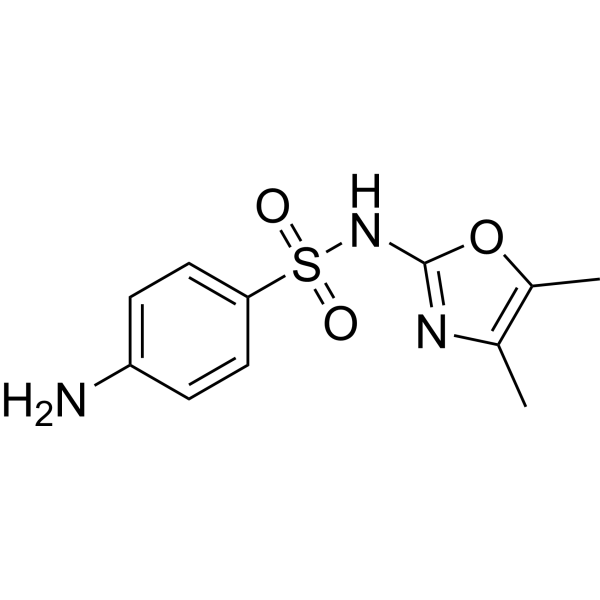
-
- HY-19543
-
|
NSC 172924
|
|
|
|
Brusatol (NSC 172924) is a unique inhibitor of the Nrf2 pathway that sensitizes a broad spectrum of cancer cells to Cisplatin and other chemotherapeutic agents. Brusatol enhances the efficacy of chemotherapy by inhibiting the Nrf2-mediated defense mechanism. Brusatol can be developed into an adjuvant chemotherapeutic agent . Brusatol increases cellular apoptosis .
|
-
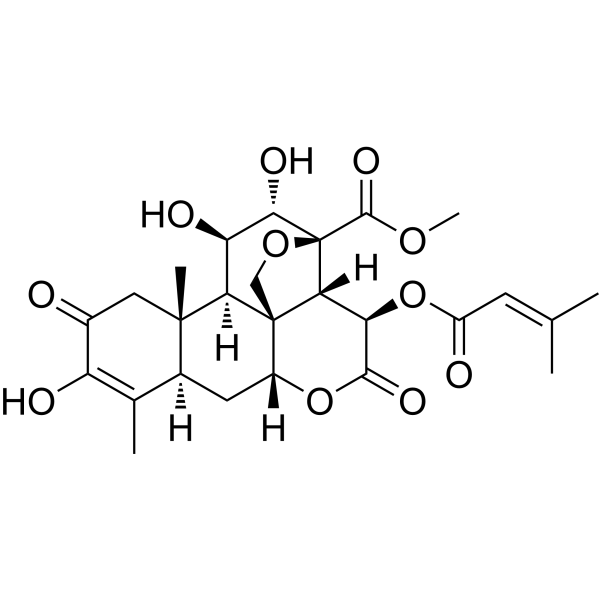
-
- HY-W017316
-
|
4-Carvomenthenol
|
Endogenous Metabolite
Bacterial
Fungal
|
Infection
Inflammation/Immunology
Cancer
|
|
Terpinen-4-ol (4-Carvomenthenol) is a naturally occurring monoterpene, and can be extracted from a variety of aromatic plants. Terpinen-4-ol is a potent bactericidal agent which possess antifungal , anti-inflammatory and antitumor properties as well, suggesting Terpinen-4-ol to be used for relevant research .
|
-
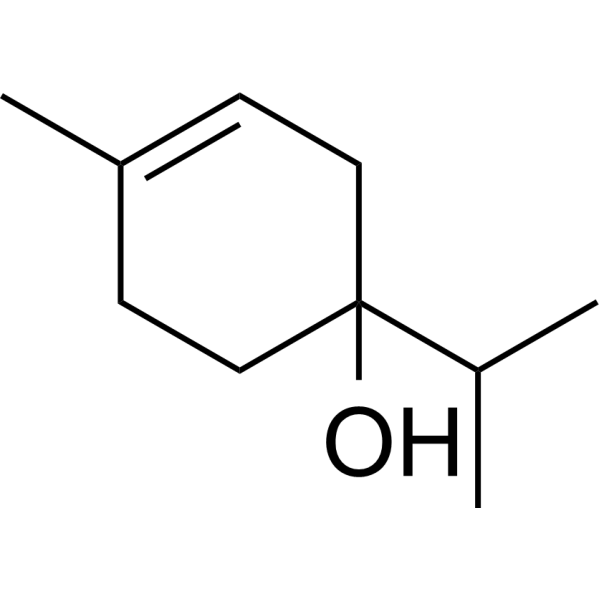
-
- HY-17400
-
Tegafur
1 Publications Verification
FT 207; NSC 148958
|
Nucleoside Antimetabolite/Analog
|
Cancer
|
|
Tegafur (FT 207; NSC 148958) is a chemotherapeutic 5-FU proagent used in the treatment of cancers; is a component of tegafur-uracil.
|
-
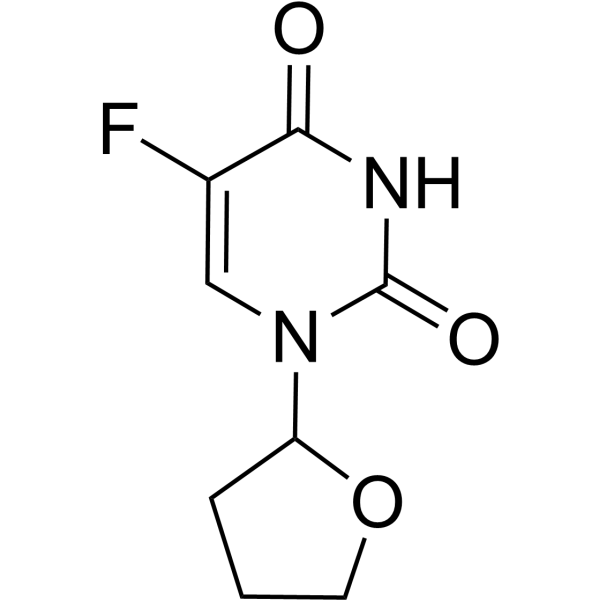
-
- HY-108315
-
|
6-Chrysenamine
|
Others
|
Inflammation/Immunology
Cancer
|
|
6-Aminochrysene (6-Aminochrysene) is an aromatic amine used as a chemotherapeutic agent in the treatment of splenomegaly, myeloid leukemia, and breast cancer.
|
-
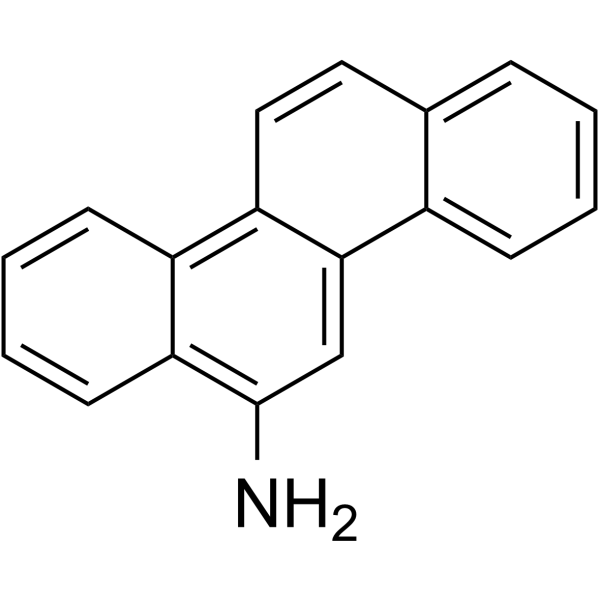
-
- HY-17419S1
-
-
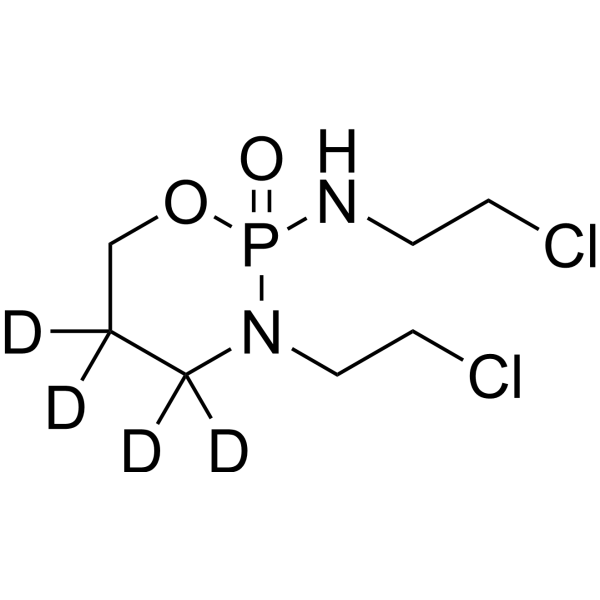
-
- HY-13585S
-
-
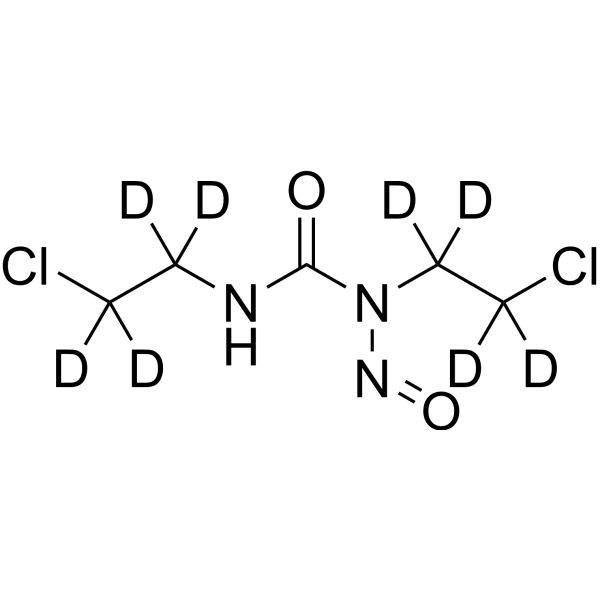
-
- HY-119172
-
-
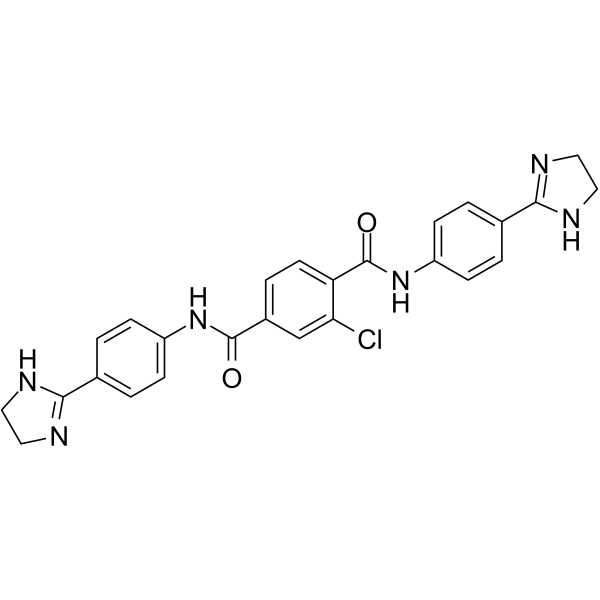
-
- HY-13585R
-
|
|
DNA Alkylator/Crosslinker
|
Cancer
|
|
Carmustine (Standard) is the analytical standard of Carmustine. This product is intended for research and analytical applications. Carmustine is an antitumor chemotherapeutic agent, which works by akylating DNA and RNA.
|
-
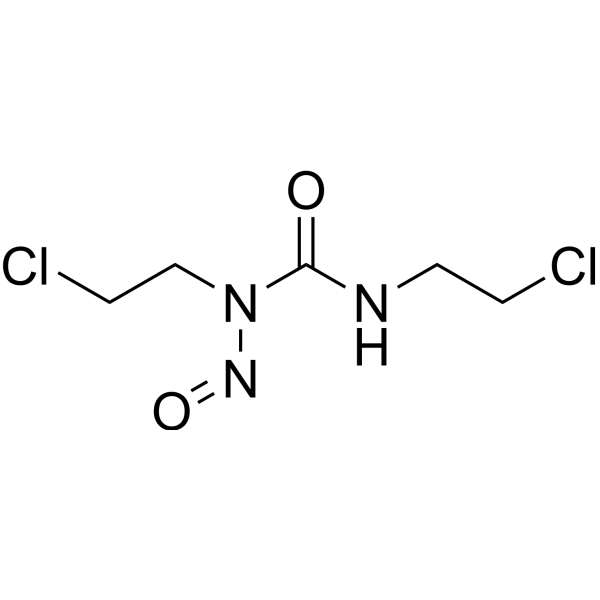
-
- HY-N7029
-
|
|
Others
|
Cancer
|
|
3',4',5',5,7-Pentamethoxyflavone, a natural flavonoid extracted from Rutaceae plants, sensitizes chemoresistant cancer cells to chemotherapeutic agents by inhibition of Nrf2 pathway .
|
-
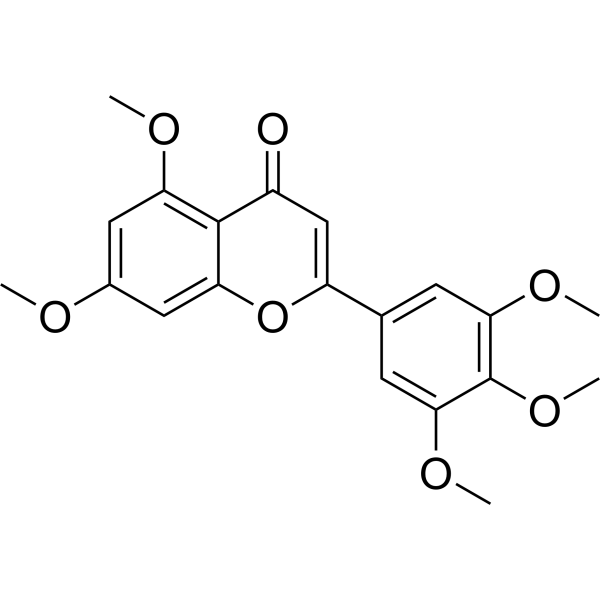
-
- HY-B0147A
-
|
Pefloxacinium mesylate
|
Bacterial
Antibiotic
|
Infection
|
|
Pefloxacin mesylate is a an antibacterial agent and prevents bacterial DNA replication by inhibiting DNA gyrase (topoisomerse)
Target: DNA gyrase
Pefloxacin is a synthetic chemotherapeutic agent used to treat severe and life-threatening bacterial infections.
|
-
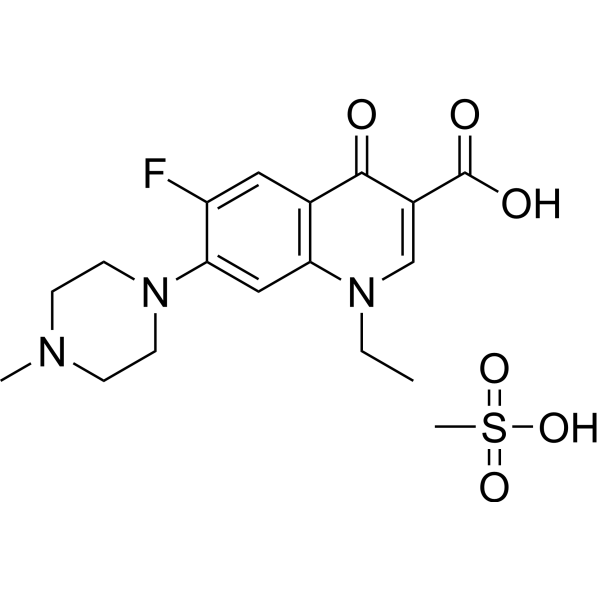
-
- HY-B0147
-
|
Pefloxacinium
|
Bacterial
Antibiotic
|
Infection
|
|
Pefloxacin is a an antibacterial agent and prevents bacterial DNA replication by inhibiting DNA gyrase (topoisomerse)
Target: DNA gyrase
Pefloxacin is a synthetic chemotherapeutic agent used to treat severe and life-threatening bacterial infections.
|
-
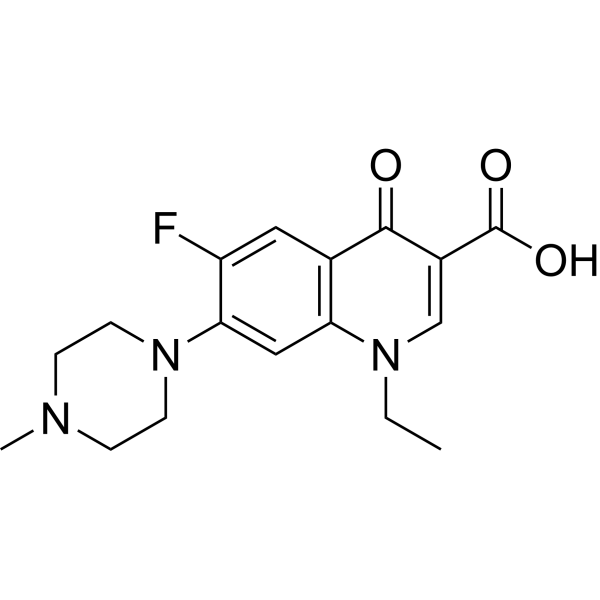
-
- HY-108251S
-
-
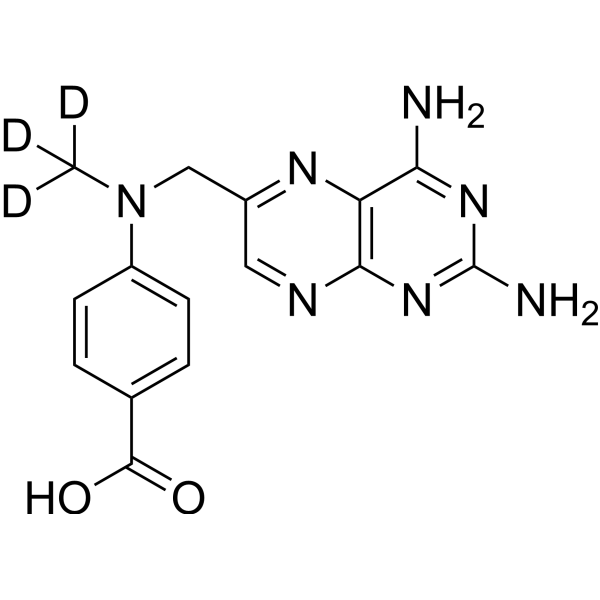
-
- HY-118982
-
|
|
Reactive Oxygen Species
|
Cancer
|
|
CT-2584 is a chemotherapeutic compound that reduces the expression of NKEF-B in several tumor cell types and kills tumor cells by inducing the production of ROS in mitochondria, commonly used in cancer research .
|
-
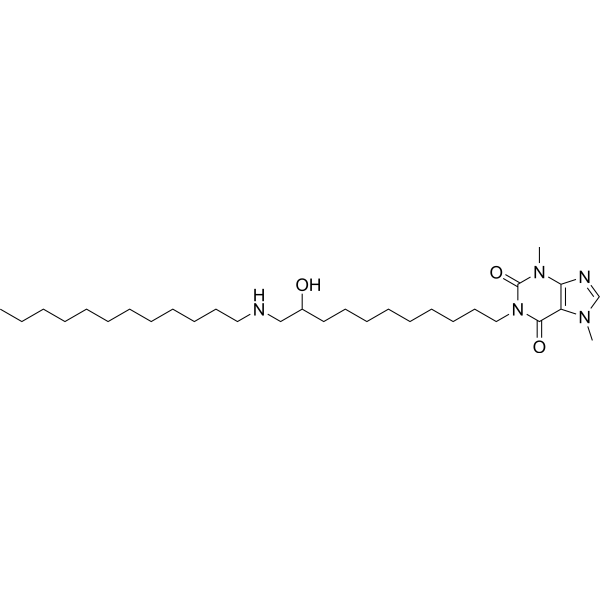
-
- HY-14596
-
Genistein
Maximum Cited Publications
39 Publications Verification
NPI 031L
|
EGFR
Autophagy
Apoptosis
Endogenous Metabolite
|
Cancer
|
|
Genistein, a soy isoflavone, is a multiple tyrosine kinases (e.g., EGFR) inhibitor which acts as a chemotherapeutic agent against different types of cancer, mainly by altering apoptosis, the cell cycle, and angiogenesis and inhibiting metastasis.
|
-
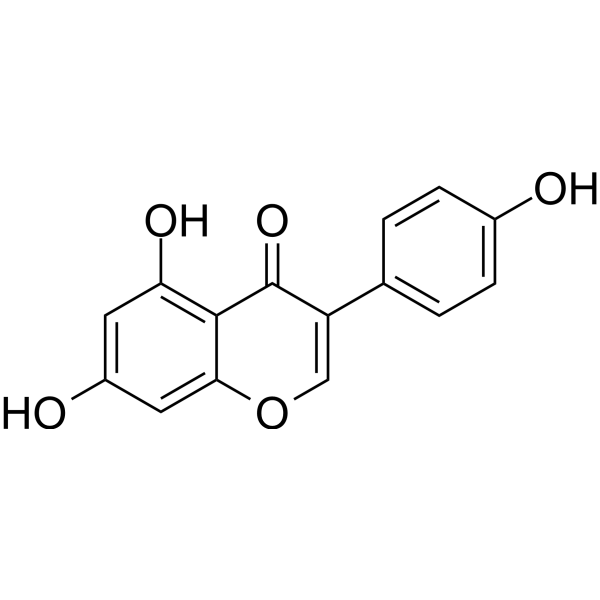
-
- HY-B0147B
-
|
Pefloxacinium mesylate dihydrate
|
Bacterial
Antibiotic
|
Infection
|
|
Pefloxacin mesylate dehydrate is a an antibacterial agent and prevents bacterial DNA replication by inhibiting DNA gyrase (topoisomerse)
Target: DNA gyrase
Pefloxacin is a synthetic chemotherapeutic agent used to treat severe and life-threatening bacterial infections.
|
-
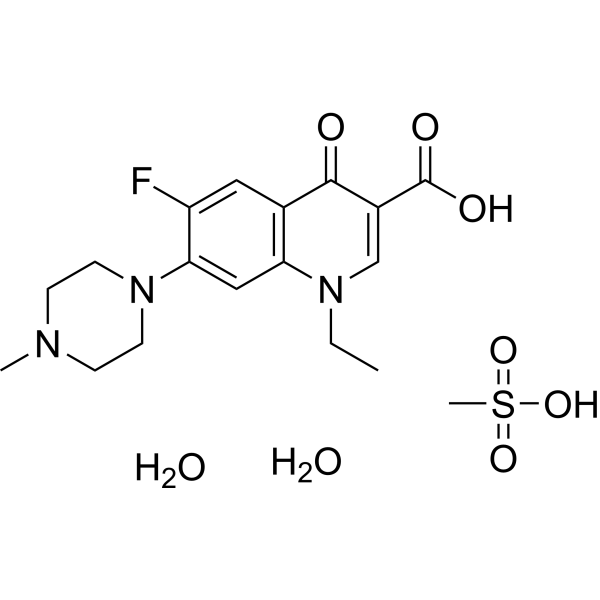
-
- HY-120102
-
|
|
G-quadruplex
|
Cancer
|
|
Emicoron is a new promising G4 ligand and bind G-rich oncogene promoters. Emicoron possesses a marked antitumoral activity? alone or in combination with chemotherapeutics in vivo. Emicoron can be used for cancer research .
|
-
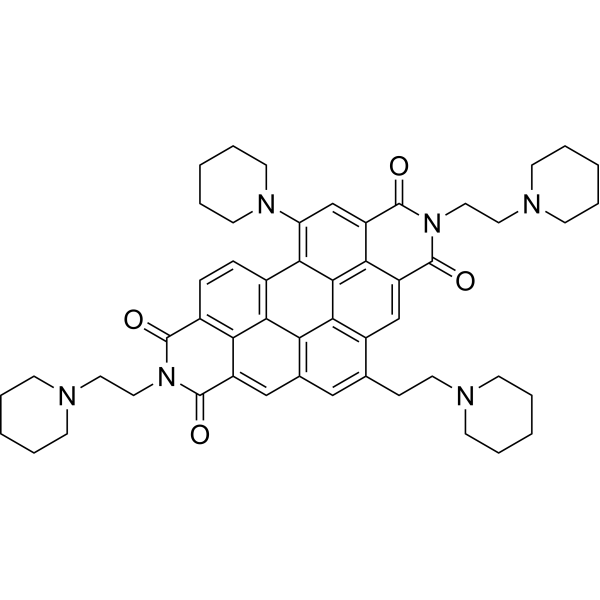
-
- HY-W048496
-
|
|
Nucleoside Antimetabolite/Analog
|
Cancer
|
|
2'-O-(2-Methoxyethyl)-cytidine is a synthetic oligonucleotide conversed from uridine. 2'-O-(2-Methoxyethyl)-uridine has the potential for chemotherapeutic agents development .
|
-
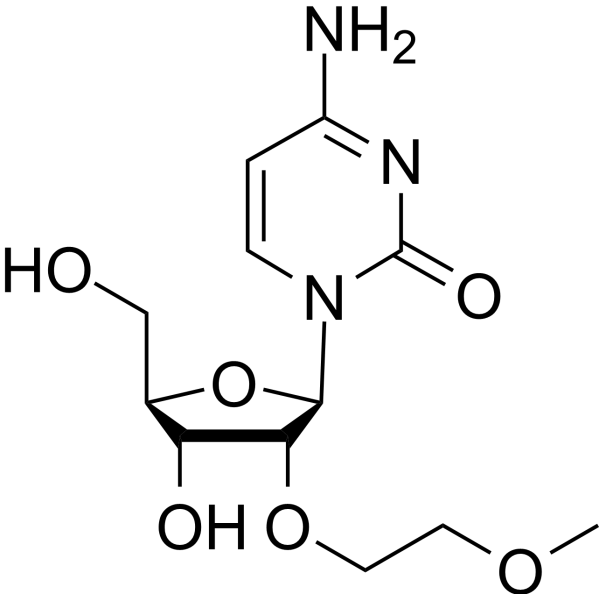
-
- HY-W048495
-
|
|
Nucleoside Antimetabolite/Analog
|
Cancer
|
|
2'-O-(2-Methoxyethyl)-uridine is a synthetic oligonucleotide conversed from uridine. 2'-O-(2-Methoxyethyl)-uridine has the potential for chemotherapeutic agents development .
|
-
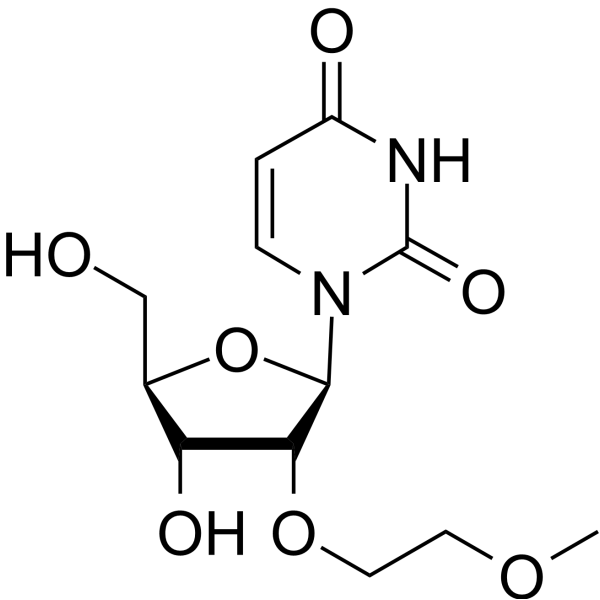
-
- HY-108251R
-
-
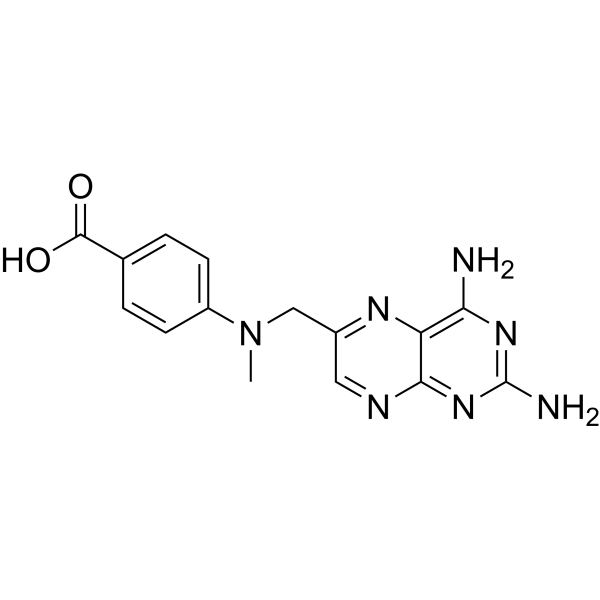
-
- HY-B1946
-
|
|
|
|
|
Dimethoate is an effective systemic insecticide for use on plants, has shown promise as a chemotherapeutic agent for control of cattle grubs and certain other insect pests of farm animals, and has high contact toxicity to house-flies and many other insects .
|
-
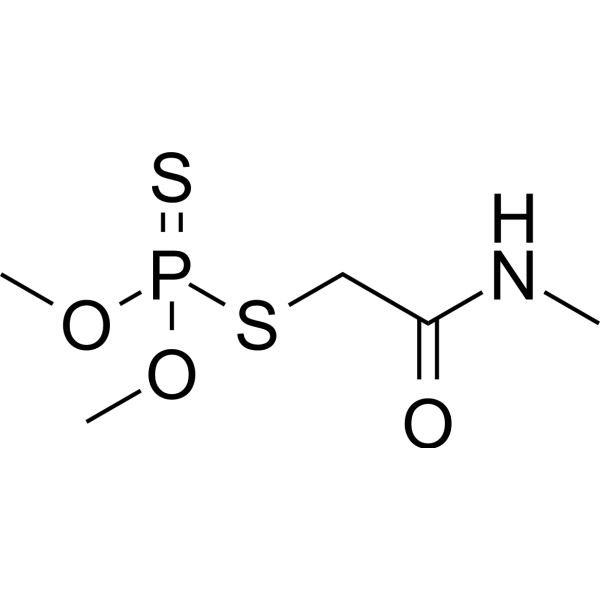
-
- HY-19542
-
|
C6-Cer; N-Hexanoylsphingosine
|
|
|
|
C6-ceramide, a ceramide pathway activator, shows activity against a variety of cancer cell lines. C6-ceramide can be used as an adjuvant for chemotherapeutic agents, to enhance anti-tumor effects .
|
-
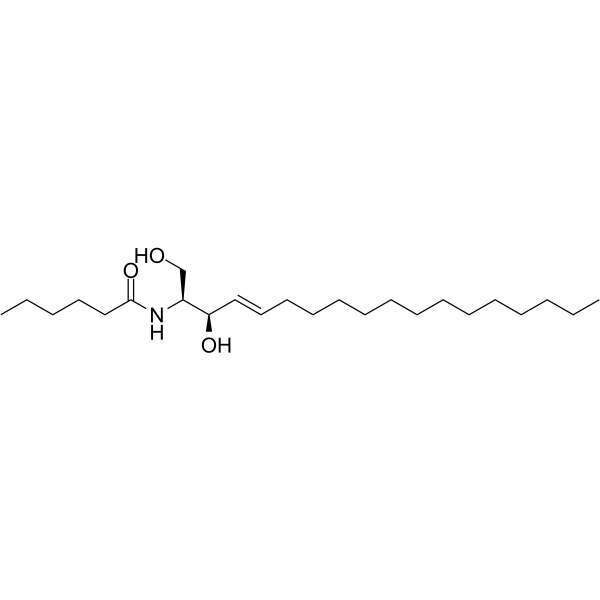
-
- HY-D1504
-
|
|
Fluorescent Dye
|
Others
|
|
IR-797 chloride is a near-infrared (NIR) dye. IR 797 has absorption maxima near 700 nm. IR-797 shows some aggregation-induced-emission (AIE) properties. IR-797 shows shows cytotoxic .
|
-
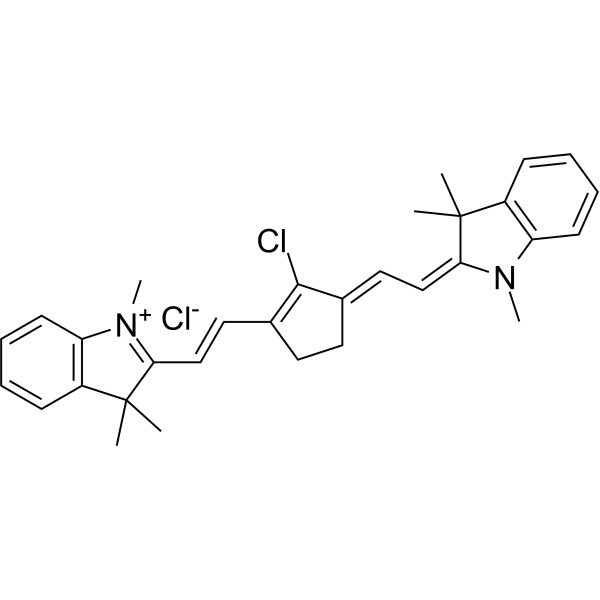
-
- HY-124325
-
|
|
DNA Alkylator/Crosslinker
|
Cancer
|
|
PIP-199 is a selective inhibitor of RMI (RecQ-mediated genome instability protein) core complex/MM2 interaction, with an IC50 of 36 μM. PIP-199 can be used for the research of sensitizing resistant tumors to DNA crosslinking chemotherapeutics .
|
-
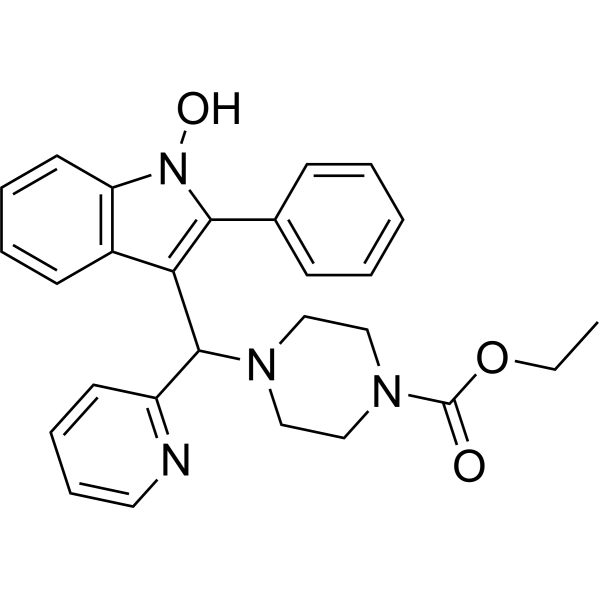
-
- HY-14596S
-
|
NPI 031L-d4
|
EGFR
Autophagy
Apoptosis
Endogenous Metabolite
|
Cancer
|
|
Genistein-d4 is the deuterium labeled Genistein. Genistein, a soy isoflavone, is a multiple tyrosine kinases (e.g., EGFR) inhibitor which acts as a chemotherapeutic agent against different types of cancer, mainly by altering apoptosis, the cell cycle, and angiogenesis and inhibiting metastasis[1][2].
|
-
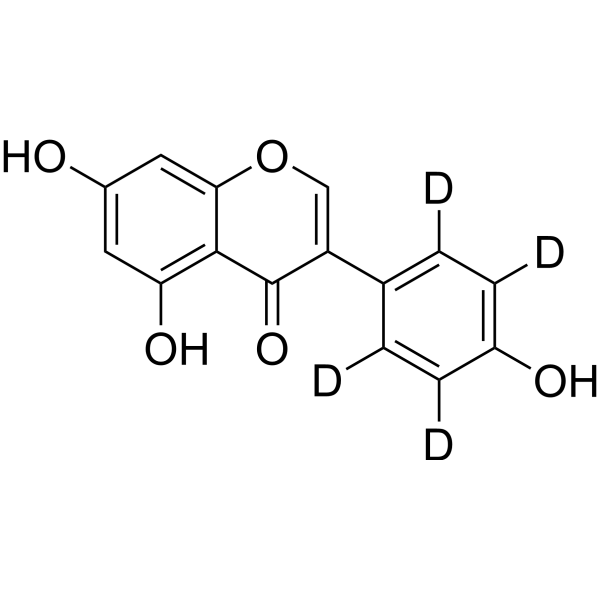
-
- HY-14596R
-
|
NPI 031L (Standard)
|
EGFR
Autophagy
Apoptosis
Endogenous Metabolite
|
Cancer
|
|
Genistein (Standard) is the analytical standard of Genistein. This product is intended for research and analytical applications. Genistein, a soy isoflavone, is a multiple tyrosine kinases (e.g., EGFR) inhibitor which acts as a chemotherapeutic agent against different types of cancer, mainly by altering apoptosis, the cell cycle, and angiogenesis and inhibiting metastasis.
|
-
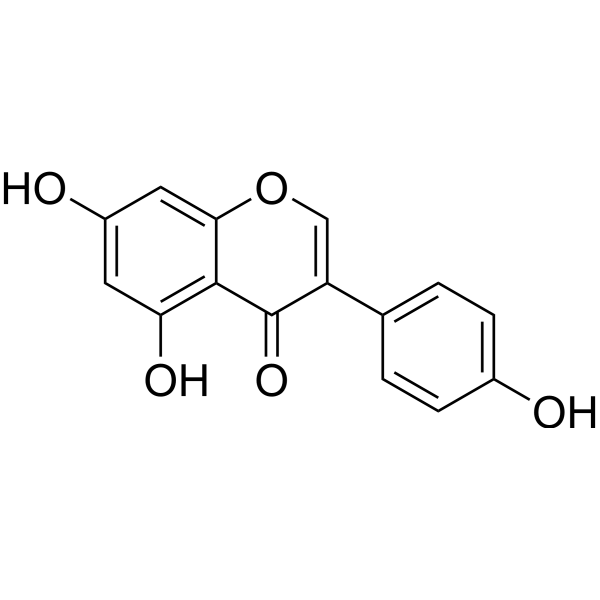
-
- HY-138084
-
|
|
Separase
|
Cancer
|
|
SIC5-6 is a potent Separase inhibitor. Separase, a large cysteine protease, involves in chromosome segregation during mitosis and meiosis, DNA damage repair, centrosome disengagement and duplication, spindle stabilization and elongation. Separase is highly overexpressed in many solid cancers, serves as an attractive chemotherapeutic target .
|
-
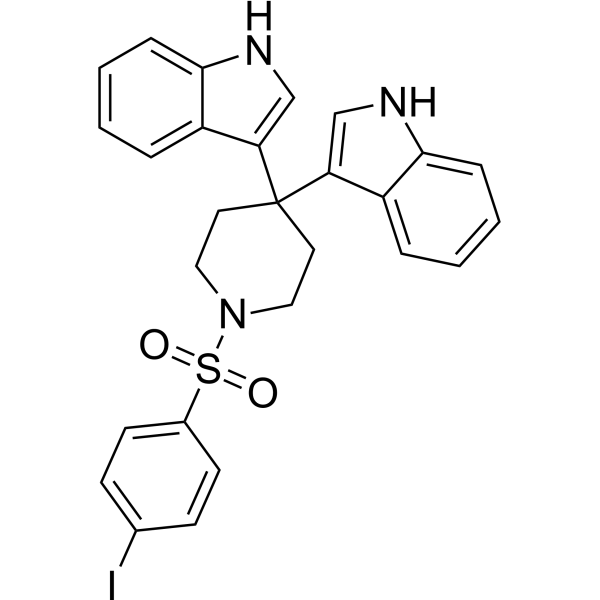
-
- HY-B1946S
-
|
|
Isotope-Labeled Compounds
|
Others
|
|
Dimethoate-d6 is the deuterium labeled Dimethoate. Dimethoate is an effective systemic insecticide for use on plants, has shown promise as a chemotherapeutic agent for control of cattle grubs and certain other insect pests of farm animals, and has high contact toxicity to house-flies and many other insects[1].
|
-
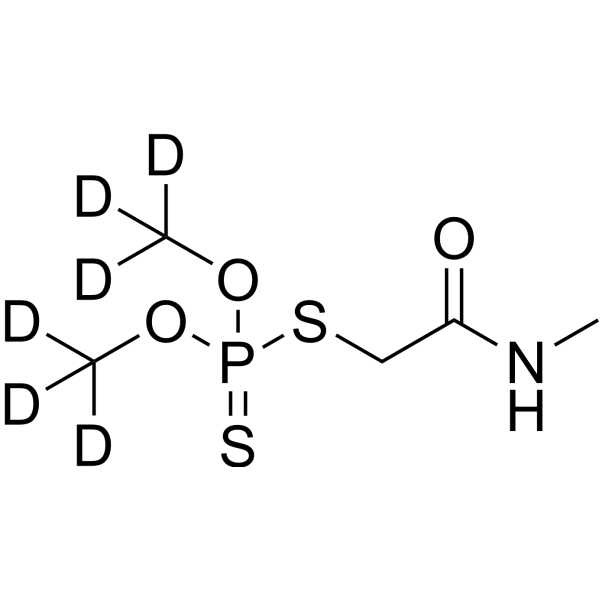
-
- HY-148413
-
|
ISIS 3521 sodium
|
PKC
|
Cancer
|
|
Aprinocarsen (ISIS 3521) sodium, a specific antisense oligonucleotide inhibitor of protein kinase C-alpha (PKC-α). Aprinocarsen sodium is a 20-mer oligonucleotide, it regulates cell differentiation and proliferation. Aprinocarsen sodium inhibits the growth of human tumor cell lines in nude mice. Aprinocarsen sodium shows the value as a chemotherapeutic compound of human cancers .
|
-
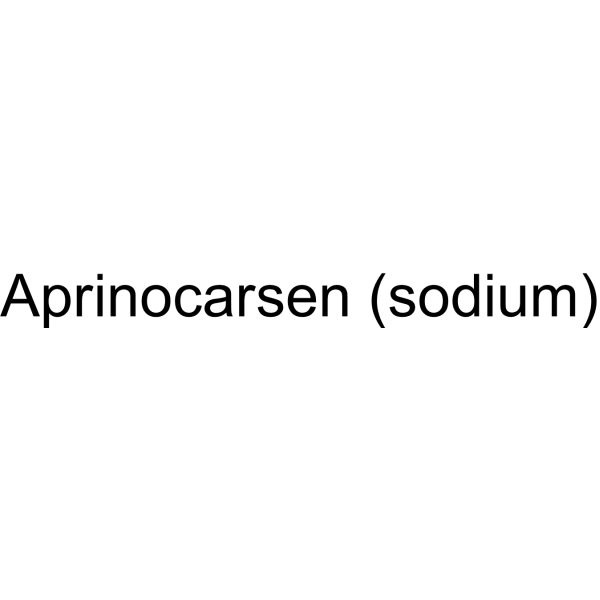
-
- HY-10426
-
|
|
Estrogen Receptor/ERR
Autophagy
|
Cancer
|
|
XCT-790 is a potent and selective inverse agonist for ERRα with an IC50 value of 0.37 μM. XCT-790 induces cell death in chemotherapeutic resistant cancer cells. XCT-790 (Compound 12) is inactive against ERRγ and the estrogen receptors ERα and ERβ .
|
-
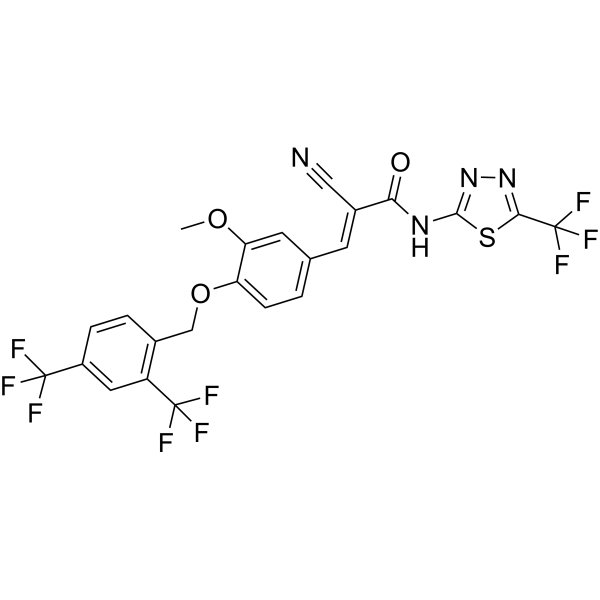
-
- HY-120574
-
|
|
ADC Cytotoxin
Topoisomerase
|
Cancer
|
|
TH1338 (compound 3b), an orally active camptothecin derivative and a potent chemotherapeutic agent for cancer, demonstrates excellent cytotoxic potency against human tumor cell lines in vitro. TH1338 (compound 3b) possesses significant brain penetration, favorable efflux pump properties, and hematological toxicity profile .
|
-
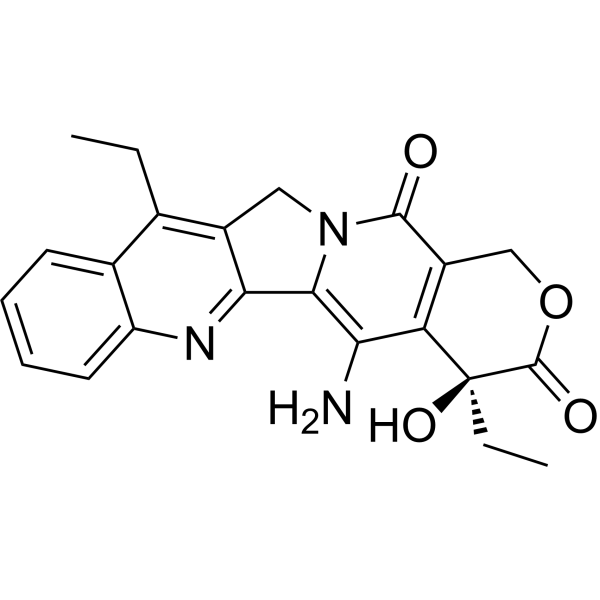
-
- HY-147271
-
|
|
Drug-Linker Conjugates for ADC
|
Cancer
|
|
Mal-PEG8-Val-Ala-PAB-Exatecan (Compound 9b) is an antibody-drug conjugate linker (ADC linker) that binds to Nectin-4 polypeptides conjugated to chemotherapeutic agents. Mal-PEG8-Val-Ala-PAB-Exatecan can be used for cancer research .
|
-
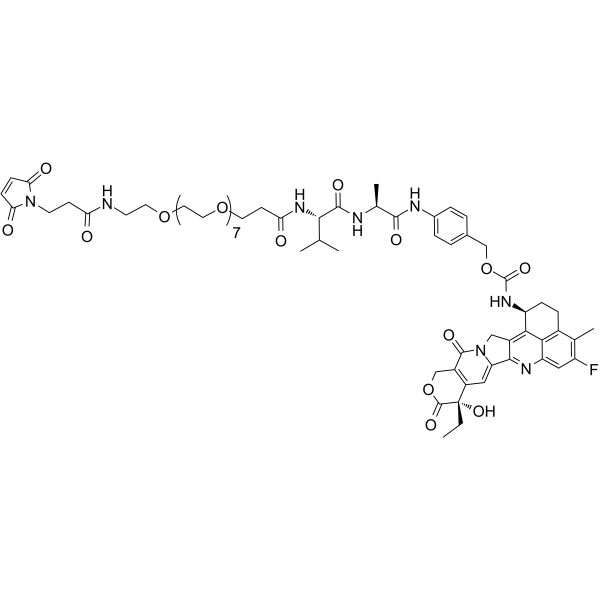
-
- HY-161098
-
|
|
Apoptosis
|
Cancer
|
|
Apoptosis inducer 14 (Compd 7f), a chemotherapeutic agent, induces intrinsic and extrinsic apoptotic death mediated P53. Apoptosis inducer 14 exhibits IC50 values of 193.93 μg/mL, 6.76 μg/mL and 222.67 μg/mL in A549, HCT116 and HF84 cells, respectively .
|
-
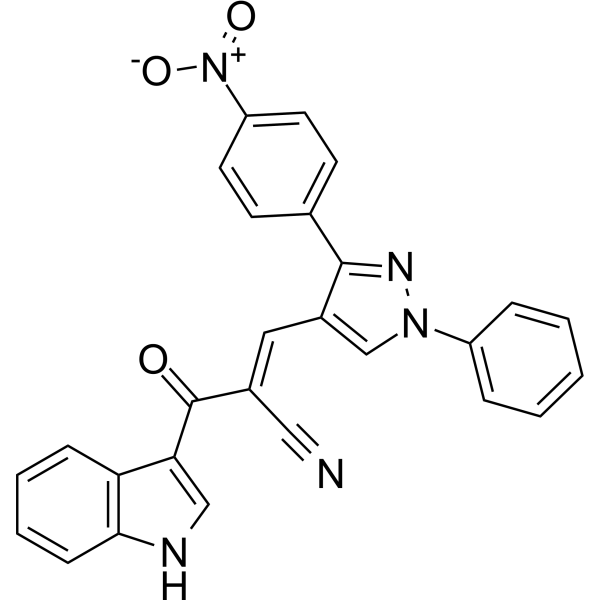
-
- HY-16965
-
TH287
2 Publications Verification
|
DNA/RNA Synthesis
|
Cancer
|
|
TH287 is a potent and selective inhibitor of MTH1, with an IC50 of 0.8 nM. TH287 is highly selective towards MTH1, with no relevant inhibition of MTH2, NUDT5, NUDT12, NUDT14, NUDT16, dCTPase, dUTPase and ITPA at 100 μM. TH287 could act as a chemotherapeutic agent for cancer research .
|
-
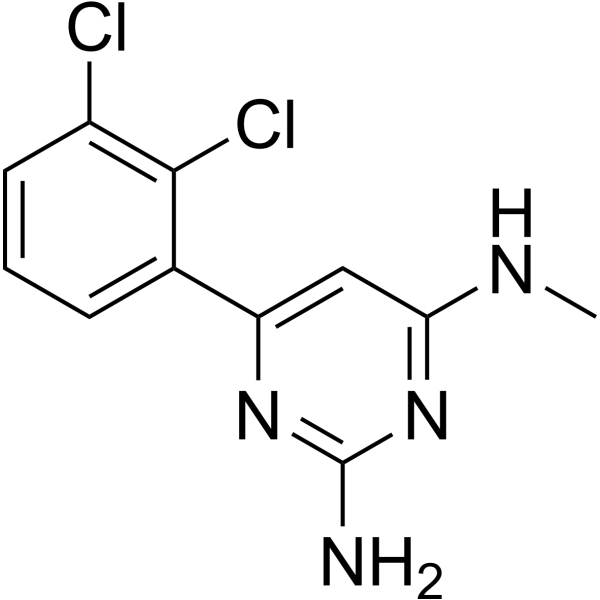
-
- HY-16965A
-
|
|
DNA/RNA Synthesis
|
Cancer
|
|
TH287 hydrochloride is a potent and selective inhibitor of MTH1, with an IC50 of 0.8 nM. TH287 hydrochloride is highly selective towards MTH1, with no relevant inhibition of MTH2, NUDT5, NUDT12, NUDT14, NUDT16, dCTPase, dUTPase and ITPA at 100 μM. TH287 hydrochloride could act as a chemotherapeutic agent for cancer research .
|
-
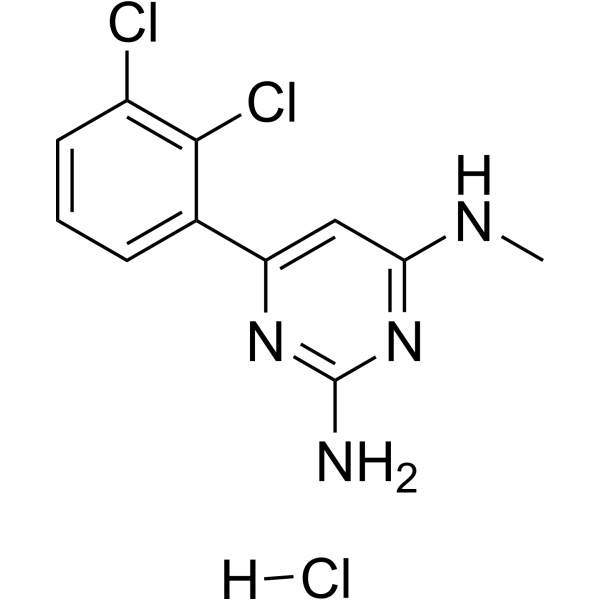
-
- HY-150650
-
|
|
Others
|
Cancer
|
|
S07-2001 is a potent and selective aldo-keto reductase 1C3 (AKR1C3) inhibitor with an IC50 value of 2.08 μM. S07-2001 enhances the activity of Doxorubicin against cancer cells. S07-2001 has potential as a chemotherapeutic potentiator for cancer agent resistance .
|
-
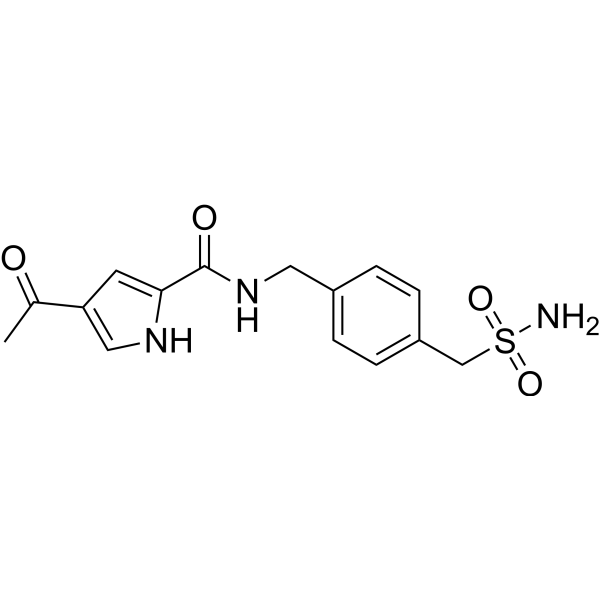
-
- HY-150649
-
|
|
Others
|
Cancer
|
|
S07-2005 racemic is a potent and selective aldo-keto reductase 1C3 (AKR1C3) inhibitor with an IC50 value of 0.13 μM and 0.75 μM for AKR1C3 and AKR1C4, respectively. S07-2005 racemic has potential as a chemotherapeutic potentiator for cancer agent resistance .
|
-
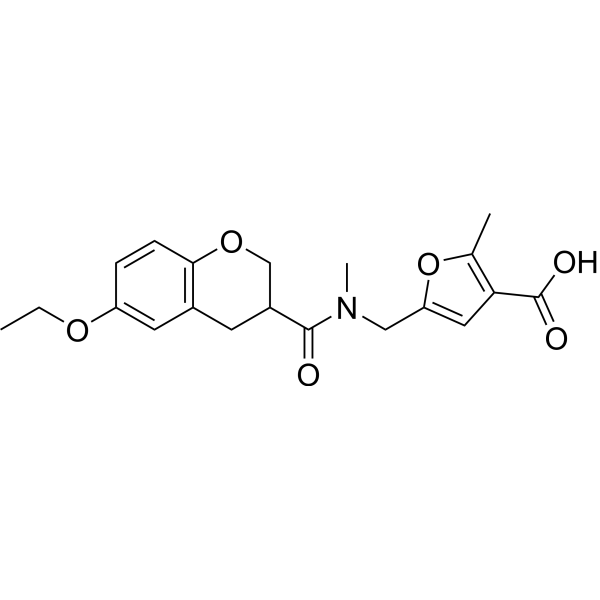
- HY-12455
-
|
|
ADC Cytotoxin
Apoptosis
Caspase
|
Cancer
|
|
Duocarmycin A, which is one of well-known antitumor antibiotics, is a DNA alkylator and efficiently alkylates adenine N3 at the 3′ end of AT-rich sequences in the DNA. Duocarmycin A, as a chemotherapeutic agent, results HLC-2 cells typically apoptotic changes, including chromatin condensation, sub-G1 accumulation in DNA histogram pattern, and decrease in procaspase-3 and 9 levels .
|
-
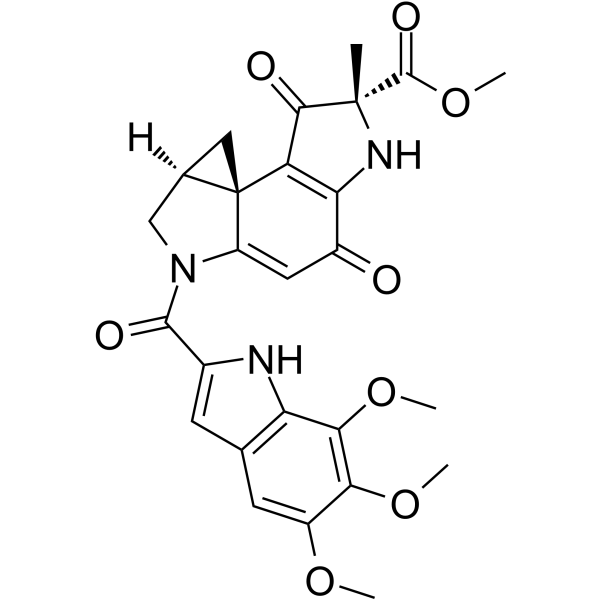
- HY-128729
-
|
|
Others
|
Cancer
|
|
DNA2 inhibitor C5 is a potent, competitive and specific inhibitor of DNA2 nuclease activity with an IC50 of 20 μM. DNA2 inhibitor C5 inhibits nuclease, DNA dependent ATPase, helicase, and DNA binding activities of DNA2. DNA2 inhibitor C5 is a promising lead compound to develop sensitizers for cancer chemotherapeutics that cause replication stress .
|
-
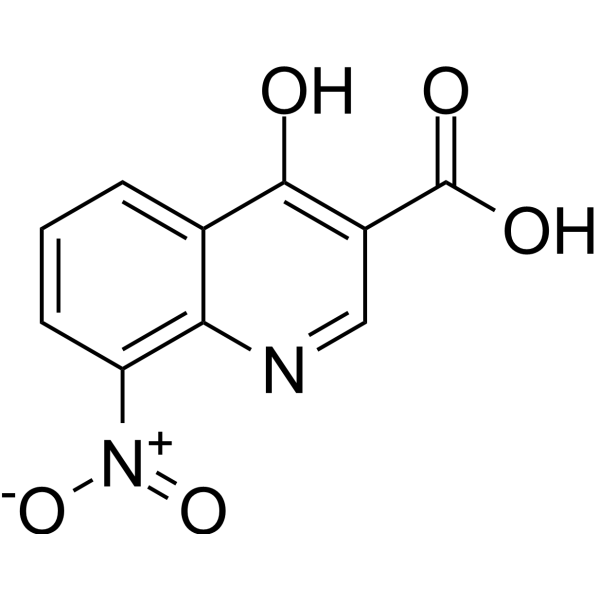
- HY-19824
-
|
|
Autophagy
|
Cancer
|
|
3PO is an inhibitor of PFKFB3. 3PO attenuates the proliferation of several cancer cell lines with IC50s of 1.4-24 μmol/L. 3PO suppresses glucose uptake and decreases the intracellular concentration of Fru-2,6-BP, lactate, ATP, NAD + and NADH. 3PO can be used for the research of cancer .
|
-
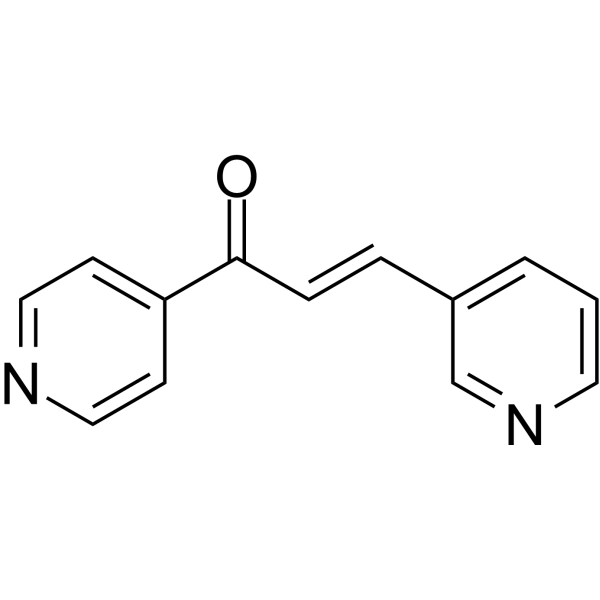
- HY-106634
-
|
Methylglyoxal-bis(guanylhydrazone); MGBG; Methyl-GAG
|
HIV
Apoptosis
|
Infection
Cancer
|
|
Mitoguazone (Methylglyoxal-bis(guanylhydrazone)) is a synthetic polycarbonyl derivative with potent antineoplastic activity. Mitoguazone is a brain-penetrant and competitive S-adenosyl-methionine decarboxylase (SAMDC) inhibitor that disrupts polyamine biosynthesis. Mitoguazone induces cell apoptosis. Mitoguazone inhibits HIV DNA integration into the cellular DNA in both monocytes and macrophages. Mitoguazone has the potential for acute leukemia, Hodgkin's and non-Hodgkin's lymphoma treatment .
|
-
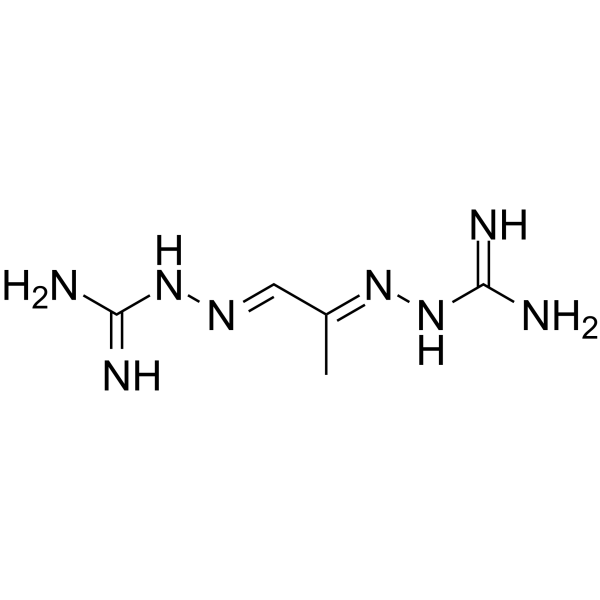
- HY-108251
-
|
DAMPA
|
Antifolate
Drug Metabolite
Dihydrofolate reductase (DHFR)
Parasite
|
Infection
Inflammation/Immunology
|
|
Methotrexate metabolite (DAMPA), the active metabolite of Methotrexate. Methotrexate is a folic acid antagonist that is widely used as an immunosuppressant and chemotherapeutic agent . Methotrexate metabolite is an antimalarial agent, which inhibits the parasite growth with an IC50 of 446 nM against the antifolate-sensitive strain and 812 nM against the highly resistant strain under physiological folate conditions. Methotrexate metabolite is inactive against mammalian cells. Methotrexate metabolite is a minimal inhibitor of dihydrofolate reductase among metabolites of methotrexate .
|
-
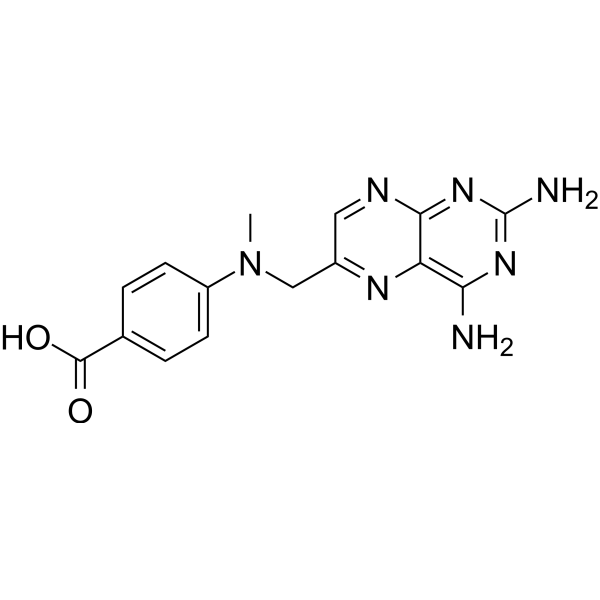
- HY-113914
-
|
Elraglusib
|
GSK-3
Apoptosis
Autophagy
|
Cancer
|
|
9-ING-41 (Elraglusib) is a maleimide-based ATP-competitive and selective glycogen synthase kinase-3β (GSK-3β) inhibitor with an IC50 of 0.71 μM. 9-ING-41 significantly leads to cell cycle arrest, autophagy and apoptosis in cancer cells. 9-ING-41 has anticancer activity and has the potential for enhancing the antitumor effects of chemotherapeutic agents .
|
-
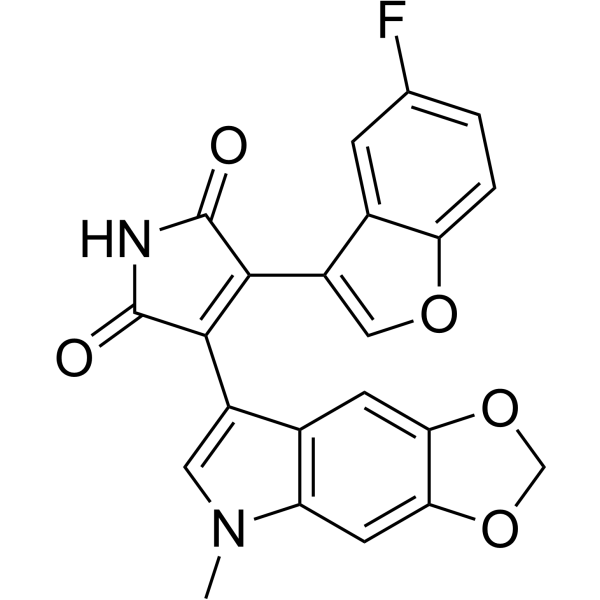
- HY-B1080A
-
|
|
Influenza Virus
Akt
|
Infection
Metabolic Disease
Inflammation/Immunology
Cancer
|
|
Tilorone is an orally active antiviral agent and interferon inducer that also has potential antineoplastic, immunomodulatory, and metabolic modulating effects. Tilorone induces an abnormally delayed interferon response and primarily stimulates interferon production in lymphoid tissue. Thus, Tilorone exerts antiviral effects and can be used as a chemotherapeutic agent. Tilorone has the potential to inhibit type 2 diabetes by increasing glucose uptake in vivo and in skeletal muscle cells by enhancing Akt2/AS160 signaling and glucose transporter levels .
|
-
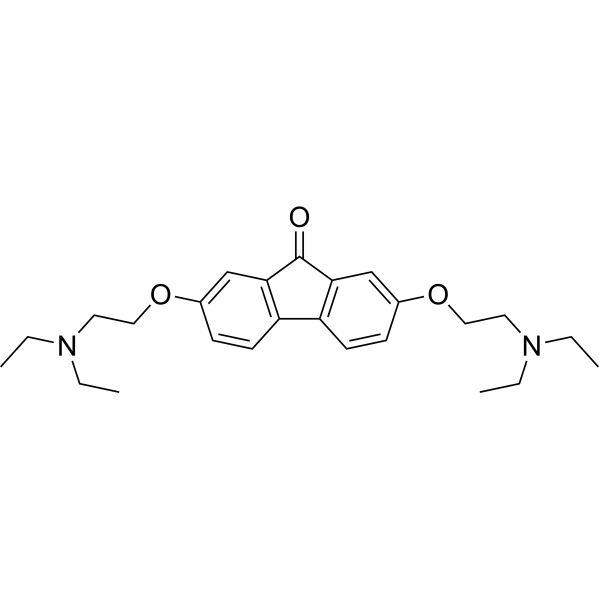
- HY-119312
-
|
|
PKC
|
Cancer
|
|
C8 Dihydroceramide is a negative control of C8 Ceramide. C8-Ceramide (N-Octanoyl-D-erythro-sphingosine) is a cell-permeable analog of naturally occurring ceramides. C8-Ceramide has anti-proliferation properties and acts as a potent chemotherapeutic agent. C8-Ceramide stimulates dendritic cells to promote T cell responses upon virus infections. C8-Ceramide induces slight activation of protein kinase (PKC) in vitro .
|
-
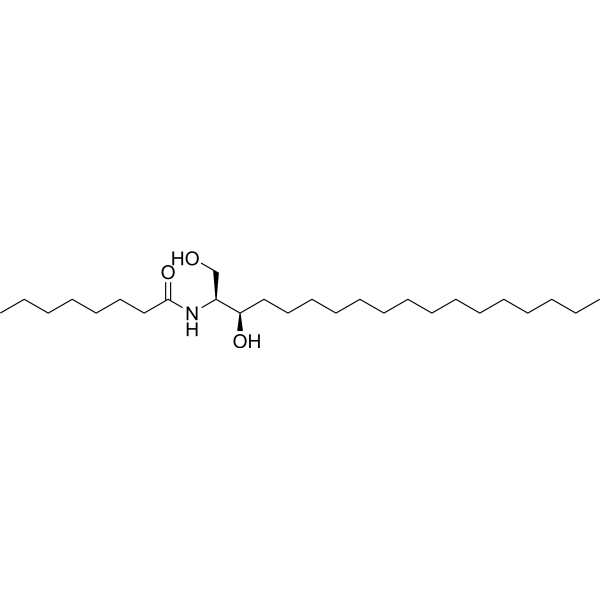
- HY-150644
-
|
|
Others
|
Cancer
|
|
S07-2010 is a potent pan-AKR1C (aldo-keto reductase family 1 member C) inhibitor, with IC50 values of 0.19, 0.36, 0.47, and 0.73 μM for AKR1C3, AKR1C4, AKR1C1 and AKR1C2, respectively. S07-2010 induces apoptosis in A549/DDP cells. S07-2010 strengthens the cytotoxicity of chemotherapeutic agents in drug-resistant cells. S07-2010 significantly inhibits the proliferation of drug-resistant cells .
|
-
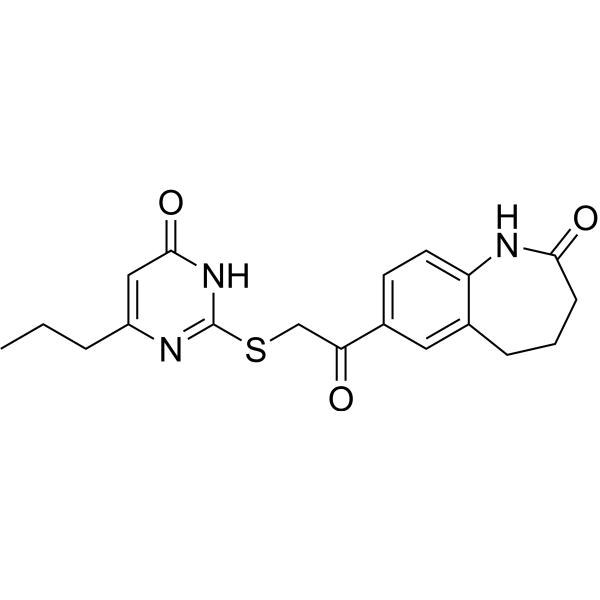
- HY-N3387
-
|
|
Apoptosis
NF-κB
Akt
MMP
|
Inflammation/Immunology
Cancer
|
|
Licoricidin (LCD) is isolated from Glycyrrhiza uralensis Fisch, possesses anti-cancer activities. Licoricidin (LCD) inhibit SW480 cells (IC50=7.2 μM) by inducing cycle arrest, apoptosis and autophagy, and is a potential chemopreventive or chemotherapeutic agent against colorectal cancer . Licoricidin (LCD) inhibits Lung Metastasis by inhibition of tumor angiogenesis and lymphangiogenesis as well as changes in the local microenvironment of tumor tissues the anticarcinogenic effect . Licoricidin enhanced gemcitabine-induced cytotoxicity in Osteosarcoma (OS) cells by inactivation of the Akt and NF-κB pathways in vitro and in vivo . Licoricidin blocks UVA-induced photoaging via ROS scavenging, limits the activity of MMP-1, it can be considered as an active ingredient in new topically applied anti-ageing formulations .
|
-
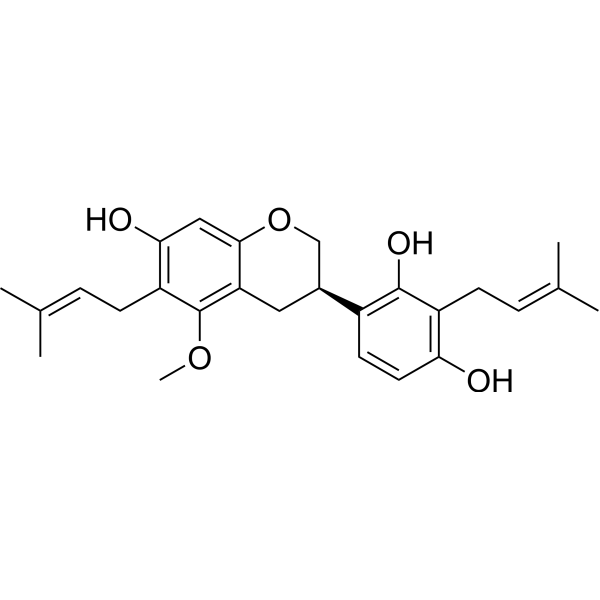
-
-
HY-L112
-
|
|
100 compounds
|
|
Chemotherapy is one of the most common treatments for cancer. It can be used alone for some types of cancer or in combination with other treatments such as radiation or surgery. Chemotherapy drugs usually target cells at different phases of the cell cycle and inhibit tumor proliferation and avoid cancer cell invasion and metastasis. It is a cancer treatment method that kills cancer cells with drugs.
Chemotherapeutic agents can be classified into alkylating agents, antimetabolites, antimicrotubular agents, antibiotics, etc. according to the mechanism of action. MCE offers a unique collection of 100 chemotherapy drugs, which is a useful tool for cancer treatment research.
|
| Cat. No. |
Product Name |
Type |
-
- HY-D1504
-
|
|
Dyes
|
|
IR-797 chloride is a near-infrared (NIR) dye. IR 797 has absorption maxima near 700 nm. IR-797 shows some aggregation-induced-emission (AIE) properties. IR-797 shows shows cytotoxic .
|
| Cat. No. |
Product Name |
Type |
-
- HY-130751
-
|
|
Drug Delivery
|
|
DODAP is a cationic lipid. The ionizable lipid DODAP is the lipid component of liposomes (pKa = 5.59 in TNS binding tests). DODAP can be used for siRNA encapsulation and in vitro and in vivo delivery of immunostimulated chemotherapeutic active molecules .
|
| Cat. No. |
Product Name |
Category |
Target |
Chemical Structure |
| Cat. No. |
Product Name |
Chemical Structure |
-
- HY-B0245S
-
|
|
|
Busulfan-d8 is a deuterium labeled Busulfan. Busulfan is a potent alkylating antineoplastic agent. Busulfan causes DNA damage by cross-linking DNAs and DNA and proteins. Busulfan inhibits thioredoxin reductase. Busulfan induces apoptosis. Busulfan is an immunosuppressive and myeloablative chemotherapeutic agent[1][2][3].
|
-

-
- HY-13585S
-
|
|
|
Carmustine-d8 is the deuterium labeled Carmustine. Carmustine is an antitumor chemotherapeutic agent, which works by akylating DNA and RNA[1][2].
|
-

-
- HY-14596S
-
|
|
|
Genistein-d4 is the deuterium labeled Genistein. Genistein, a soy isoflavone, is a multiple tyrosine kinases (e.g., EGFR) inhibitor which acts as a chemotherapeutic agent against different types of cancer, mainly by altering apoptosis, the cell cycle, and angiogenesis and inhibiting metastasis[1][2].
|
-

-
- HY-17419S1
-
|
|
|
Ifosfamide-d4 is the deuterium labeled Ifosfamide. Ifosfamide is an alkylating chemotherapeutic agent with activity against a wide range of tumors[1][2].
|
-

-
- HY-108251S
-
|
|
|
Methotrexate metabolite-d3 is the deuterium labeled Methotrexate metabolite. Methotrexate metabolite (DAMPA), the active metabolite of Methotrexate. Methotrexate is a folic acid antagonist that is widely used as an immunosuppressant and chemotherapeutic agent[1].
|
-

-
- HY-B1946S
-
|
|
|
Dimethoate-d6 is the deuterium labeled Dimethoate. Dimethoate is an effective systemic insecticide for use on plants, has shown promise as a chemotherapeutic agent for control of cattle grubs and certain other insect pests of farm animals, and has high contact toxicity to house-flies and many other insects[1].
|
-

Your information is safe with us. * Required Fields.
Inquiry Information
- Product Name:
- Cat. No.:
- Quantity:
- MCE Japan Authorized Agent:




































































